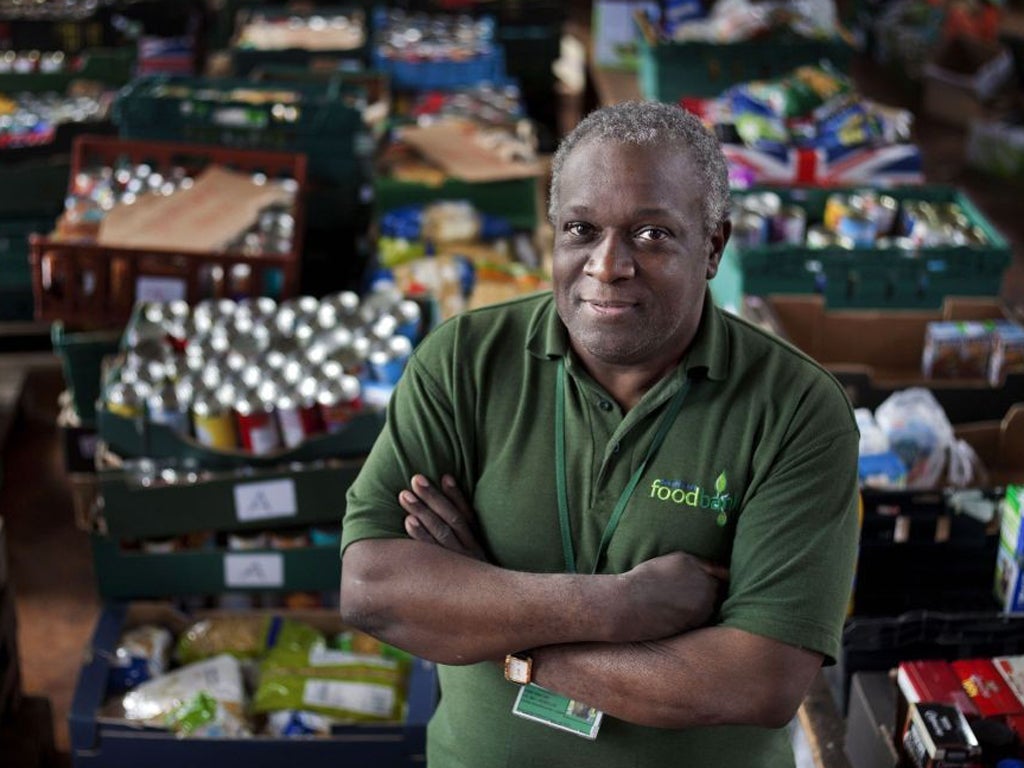Britain's Hidden Hungry, BBC2, Tuesday The Year the Town Hall Shrank, BBC4, Thursday Operation Iceberg, BBC2, Tuesday & Thursday
As food banks open at a rate of two a week, councils struggle to make more cuts. Meanwhile, the Arctic's glaciers are melting

Your support helps us to tell the story
From reproductive rights to climate change to Big Tech, The Independent is on the ground when the story is developing. Whether it's investigating the financials of Elon Musk's pro-Trump PAC or producing our latest documentary, 'The A Word', which shines a light on the American women fighting for reproductive rights, we know how important it is to parse out the facts from the messaging.
At such a critical moment in US history, we need reporters on the ground. Your donation allows us to keep sending journalists to speak to both sides of the story.
The Independent is trusted by Americans across the entire political spectrum. And unlike many other quality news outlets, we choose not to lock Americans out of our reporting and analysis with paywalls. We believe quality journalism should be available to everyone, paid for by those who can afford it.
Your support makes all the difference.It's getting on for two years since the coalition's brutal budget cuts, and the BBC seems to be taking stock. It was a bumper week for austerity Britain misery on the box, and two documentaries showed a desperate scrabble for survival, both within the public services and on an individual level.
"Hunger is back," boomed the voiceover on Britain's Hidden Hungry. We met various people who had resorted to a food bank, run by a Christian charity, when the cupboards were, quite literally, bare. The Hope Centre in Coventry is one of 300 food banks around the country; they're opening at a rate of two a week, as rising numbers struggle to make ends meet.
The programme felt like it could have been called Britain's Broken Benefits System. Everyone seemed bewildered by their sudden poverty, and everyone seemed even more bewildered by the Kafkaesque bureaucracy of the benefits system. A 21-year-old student was apparently advised to have a baby to get money out of it; a mum of five was in a debt spiral after the halving of her housing benefit when she took a part-time job in McDonald's; another mum found the cost of child care meant she's better off not getting a job and just signing on.
They could have made the whole programme about Charlotte, the student. Having grown up in care, she was at college as well being an indefatigable volunteer and fundraiser for the Hope Centre – which she's often had to rely on herself. She's bright, sharp, remarkably resilient; she ticks herself off for being "self-pitying" when she's anything but. And her fragile little laugh, when brushing off how she only eats once a day, so her appetite stays suppressed, is gut-wrenching – though obviously not as gut-wrenching as the feeling of waking up hungry.
"There but for grace of God" is the phrase that springs to mind. The one that really, really doesn't is: "We're all in this together …" David Cameron's claim is heard echoing hollowly during the introduction to The Year the Town Hall Shrank, while yet another bewildered Briton, a pensioner in a cuts-threatened care home, asks plaintively: "Who's to blame?"
You suspect it's a question on the minds of many in Stoke-on-Trent, where the council was told to make £36m savings after the December 2010 budget. That's a lot of frontline services at risk, and this first programme of three reveals the embittered battles over what gets shut and what gets saved.
Between interviews with teary campaigners, squirming politicians and barnstorming speeches at high- drama council meetings, the documentary takes a surprisingly arty tone. It appears to be shot as if it's the Seventies, with a gritty grey lens and a soul soundtrack, over shots of kids on bikes and old factories and ladies getting their hair set. Presumably, this is to suggest we're rapidly pedalling backwards.
If all that left you chilled, Operation Iceberg warmed the heart, despite its sub-zero subject. Over two programmes, a team of scientists got up close and personal with Arctic icebergs, and their zeal was infectious. "I knew it was going to be big, but this is massive!" enthuses one. That might sound banal, but it's a reasonable response – even the numbers are boggling: 200 million tons of ice crashed into the sea off a glacier, itself made of 4,000 billion tons of ice. The film captured this monumental glory, vast heaving mountains of frozen water hoving into view, spectacularly. It also introduced the correct term for such a break-off: megaberg. Megaberg! It's brilliant, like a nature documentary version of Transformers.
Unfortunately, the narrator seems to think he's in a trailer for a blockbuster action movie, too. While the scientists are a jolly lot, chucklingly keen to abseil down glacier cracks or teeter on 100-metre-high lumps of slippery ice or come face to face with potentially peckish polar bears ("It's polar bear tastic!" explains presenter Chris Packham), the programme makers obviously decided happy researchers weren't high-stakes enough. There's a lot of dramatic, doomy music added, and a voiceover about what an utter nightmare the whole thing is.
Which is unnecessary. We can see these are scary things; what's remarkable is not how terribly perilous it all is, but that these guys are doing it with a grin, because they're so nerdily into their subject. And anyway, when you've got millions of tons of beautiful, almost alien-looking white and blue and green stuff smashing into the ocean … well, that's already quite cool enough.
Join our commenting forum
Join thought-provoking conversations, follow other Independent readers and see their replies
Comments